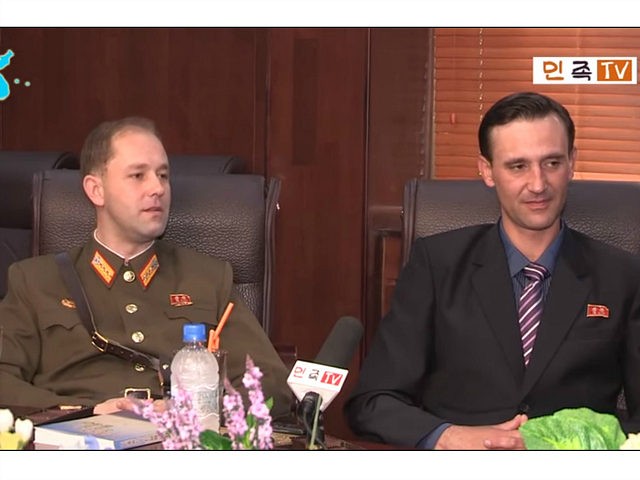After months under some of the harshest UN sanctions in history, North Korea is pushing to bring its biggest rivals, South Korea and the United States, to the negotiating table.
The latest move to attract American attention is a propaganda video featuring the North Korea-born American sons of an ex-pat who defected in 1962.
The Washington Post highlights an hour-long interview on a North Korean TV propaganda outlet with Ted and James Dresnok, the sons of James Joseph Dresnok, who has lived in North Korea since deserting the U.S. military in 1962. The Dresnok sons — who were born in Pyongyang, go by North Korean names, and have served as villains in North Korean propaganda videos due to their obvious Western ethnicity — tell the interviewer that they dream of bringing glory to Kim Jong-un and hope America ultimately embraces communism.
“My precious dream is to become a Workers’ Party member and pay back my gratitude to my general [Kim Jong Un]. I want to stand in a unified country by my general,” Ted says. James agrees: “My lifelong dream is similar to my brother’s. I want to serve my mother country with my life and bring about the unification of the Koreas so the world will see the superiority of Kim’s Korea.”
Echoing the propaganda published in North Korean state outlets like the Rodong Sinmun newspaper and the Korean Central News Agency (KCNA), the brothers urge the United States to “sign a peace treaty with North Korea and withdraw its forces and nuclear weapons from the Korean peninsula. It’s the quickest way to solve the current issue.”
“I want to advise the U.S. to drop its hostile policy against North Korea. They’ve done enough wrong and now it’s time for them to wake up from their delusions,” Ted told the interviewer, who is based in the United States, the Post notes.
The video is the latest in a stark shift in attitude out of Pyongyang towards Washington and Seoul. North Korean officials have spent the past week trying to contact their counterparts in Seoul and schedule talks without preconditions. On Saturday, the North Korean government issued a statement calling for specifically military talks with South Korea. South Korea has repeatedly rejected the offers. “There is no change of position from our government that North Korea’s denucleartization should be the top priority in regard to any dialogue with North Korea,” the South Korean government said in a statement on Tuesday regarding the invitations to talk.
The offers to speak to Seoul have involved explanations for the extremely violent rhetoric out of Pyongyang in the last six months, alleging that America has driven North Korea to threaten South Korea and that the North Korean nuclear program “has, in fact, nothing to do with the north-south relations.” After months of repeated threats of a preemptive nuclear strike on Seoul, however, the South Korean government seems ill at ease with the idea of peace talks. In addition to rejecting the invitation to talks, South Korea recently canceled a number of official visits to the North Korean/Chinese border, citing terrorist threats.
In the past year, North Korea has broadcast multiple simulations of a nuclear attack on South Korea’s presidential offices, the Cheongwadae, and is rumored to be building a replica of the presidential palace to destroy in a nuclear blast.
Experts suggest that North Korea’s change in disposition is a sign that the sanctions are threatening to collapse the struggling North Korean economy. “North Korea is struggling to find an escape route as international sanctions increase pressure,” a South Korean official told the national Chosun Ilbo newspaper this week, citing a number of diplomatic visits to the few countries that maintain friendly relations with Pyongyang, including Cuba.
Retired four-star American Gen. Walter Sharp predicted this week that the North Korean regime is close to collapse. “First off, I believe there will be strong provocations, strong attacks by North Korea that could quickly escalate into a much bigger conflict,” he said, adding, “Secondly, there will be instability in North Korea that I believe will lead to the collapse of North Korea much sooner than many of us think.”

COMMENTS
Please let us know if you're having issues with commenting.